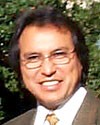In less than a month, a UA law professor will begin evaluating human rights and the freedoms of indigenous people worldwide for the United Nations.
Stephen James Anaya, a professor of human rights law and policy, will continue to teach after he begins his three-year, renewable appointed position May 1.
He is the second person to be named the U.N.’s special rapporteur on the situation of human rights and fundamental freedoms of indigenous peoples since the position’s creation in 2001.
It came about due to increased attention on the situation of indigenous peoples in recent years, Anaya said.
“”It’s been identified as an area of concern, considering the conditions they find themselves relating to human rights,”” he said.
His duties will include making two or three visits to specific countries a year for an in-depth look into the lives of people there, and investigating complaints or reports on human rights violations.
Anaya will inform the U.N. of these conditions, act as a conduit for various forces through the U.N. and national governments and provide recommendations for addressing particular issues.
He will also design proposals and a work plan, which will be subject to approval by the U.N.’s Human Rights Council, to “”offer assistance to these people in various ways,”” Anaya said.
“”It’s an honor but also a big challenge because you’re talking about looking at indigenous people worldwide, and there are indigenous people in virtually every country in the world,”” Anaya said.
Anaya assisted in introducing the UA’s Indigenous Peoples Law and Policy Program. The program advocates human rights while aiming to provide students with a global understanding about the issues indigenous peoples face and the chance to aid them in their cases.
The most recent cases involved the support of two Mayan villages that filed lawsuits in the Belize Supreme Court, and Nicaragua in the development of its natural resources.
In September, the U.N. General Assembly adopted the United Nations Declaration on the Rights of Indigenous Peoples, which will serve as an important basis for Anaya’s work.
The document articulates basic human rights, which are elaborated on in the context of indigenous peoples.
These rights are related to culture, identity, language, education, employment, health and social and economic development, among others.
“”It provides a benchmark for my work in the sense that the work entails promoting the rights of these indigenous peoples and this document lays out the rights of these various peoples,”” Anaya said.
He said he hopes to better the lives of indigenous peoples. In particular, he seeks to solve issues by developing a way to act effectively on the allegations of violations and by getting governments to work toward solutions, rather than letting them pile up.
“”I don’t want to see the system paying lip service to these people,”” he said. “”I want to see concrete action.””
There is no formal application process for the special rapporteur position; rather, candidates are nominated for the position based on merit.
Anaya was proposed as a candidate by non-governmental organizations from various parts of the world. The Human Rights Council confirmed his appointment two weeks ago.
Past accomplishments that led to Anaya obtaining the position include his high level of expertise in relevant fields and his commitment to working with indigenous peoples since his graduation from Harvard Law School in 1983.
His book “”Indigenous Peoples and International Law”” has become a standard text in the realm of human rights law.
“”I consider this to be not only a recognition of my expertise, but a recognition of the college of law in these matters and what we’ve been doing with these issues,”” he said.
“”It’s a lot to cover, a lot to do, and there are a lot of expectations that come with the position, but I’m excited to take it on and have some affect on the lives of indigenous people for the better,”” he added.









